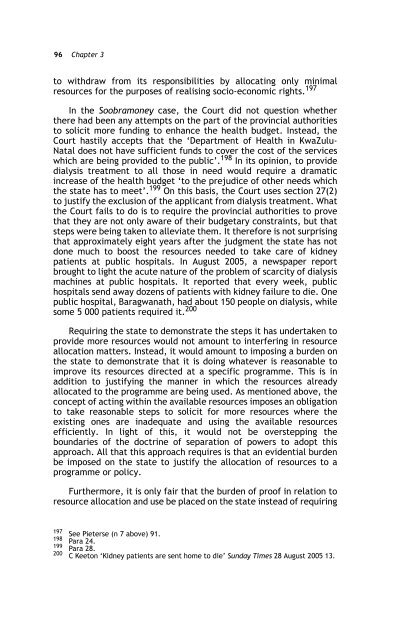LITIGATING SOCIO-ECONOMIC RIGHTS IN SOUTH AFRICA - PULP
LITIGATING SOCIO-ECONOMIC RIGHTS IN SOUTH AFRICA - PULP
LITIGATING SOCIO-ECONOMIC RIGHTS IN SOUTH AFRICA - PULP
Create successful ePaper yourself
Turn your PDF publications into a flip-book with our unique Google optimized e-Paper software.
96 Chapter 3<br />
to withdraw from its responsibilities by allocating only minimal<br />
resources for the purposes of realising socio-economic rights. 197<br />
In the Soobramoney case, the Court did not question whether<br />
there had been any attempts on the part of the provincial authorities<br />
to solicit more funding to enhance the health budget. Instead, the<br />
Court hastily accepts that the ‘Department of Health in KwaZulu-<br />
Natal does not have sufficient funds to cover the cost of the services<br />
which are being provided to the public’. 198 In its opinion, to provide<br />
dialysis treatment to all those in need would require a dramatic<br />
increase of the health budget ‘to the prejudice of other needs which<br />
the state has to meet’. 199 On this basis, the Court uses section 27(2)<br />
to justify the exclusion of the applicant from dialysis treatment. What<br />
the Court fails to do is to require the provincial authorities to prove<br />
that they are not only aware of their budgetary constraints, but that<br />
steps were being taken to alleviate them. It therefore is not surprising<br />
that approximately eight years after the judgment the state has not<br />
done much to boost the resources needed to take care of kidney<br />
patients at public hospitals. In August 2005, a newspaper report<br />
brought to light the acute nature of the problem of scarcity of dialysis<br />
machines at public hospitals. It reported that every week, public<br />
hospitals send away dozens of patients with kidney failure to die. One<br />
public hospital, Baragwanath, had about 150 people on dialysis, while<br />
some 5 000 patients required it. 200<br />
Requiring the state to demonstrate the steps it has undertaken to<br />
provide more resources would not amount to interfering in resource<br />
allocation matters. Instead, it would amount to imposing a burden on<br />
the state to demonstrate that it is doing whatever is reasonable to<br />
improve its resources directed at a specific programme. This is in<br />
addition to justifying the manner in which the resources already<br />
allocated to the programme are being used. As mentioned above, the<br />
concept of acting within the available resources imposes an obligation<br />
to take reasonable steps to solicit for more resources where the<br />
existing ones are inadequate and using the available resources<br />
efficiently. In light of this, it would not be overstepping the<br />
boundaries of the doctrine of separation of powers to adopt this<br />
approach. All that this approach requires is that an evidential burden<br />
be imposed on the state to justify the allocation of resources to a<br />
programme or policy.<br />
Furthermore, it is only fair that the burden of proof in relation to<br />
resource allocation and use be placed on the state instead of requiring<br />
197 See Pieterse (n 7 above) 91.<br />
198 Para 24.<br />
199<br />
Para 28.<br />
200 C Keeton ‘Kidney patients are sent home to die’ Sunday Times 28 August 2005 13.
















